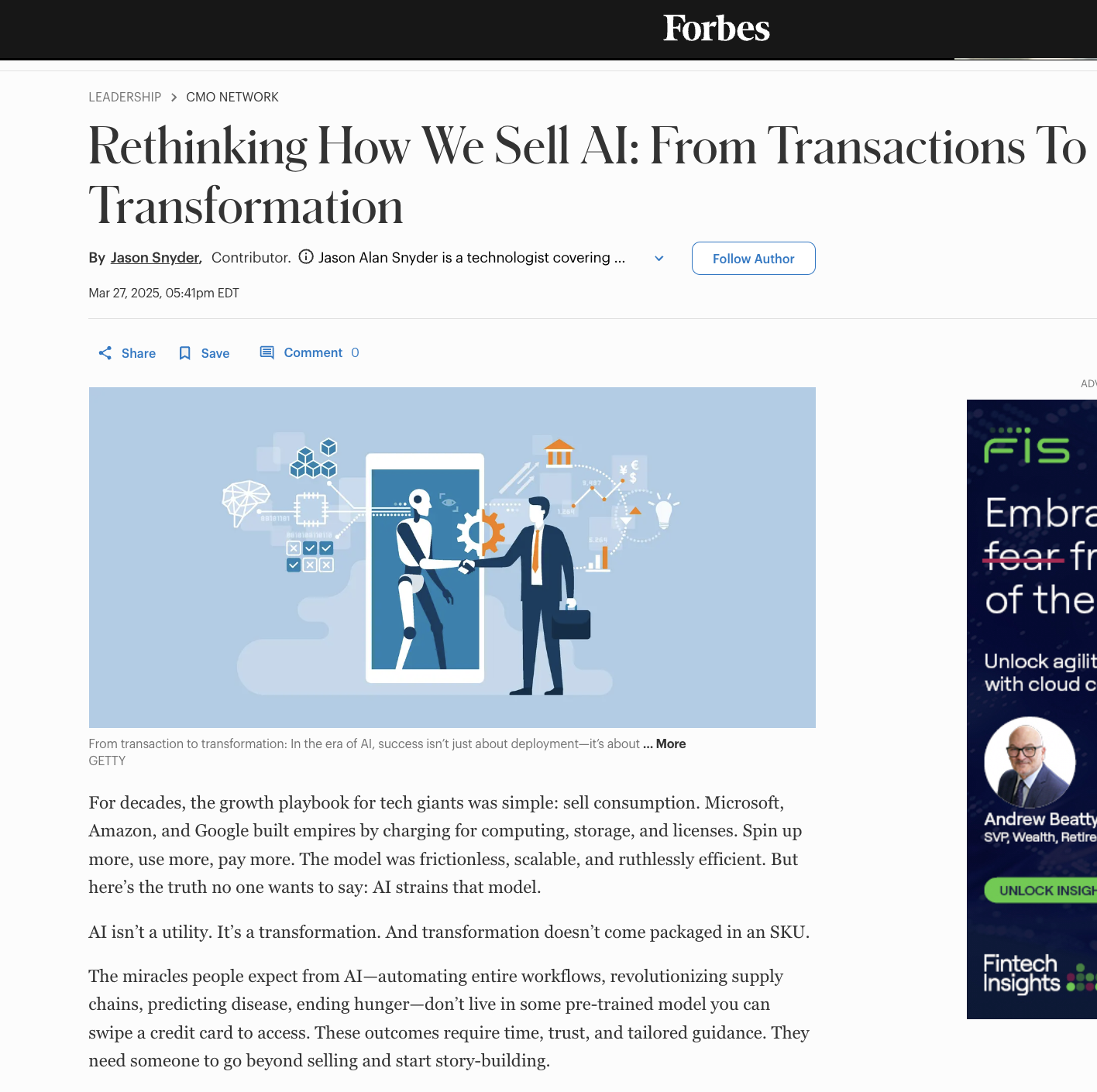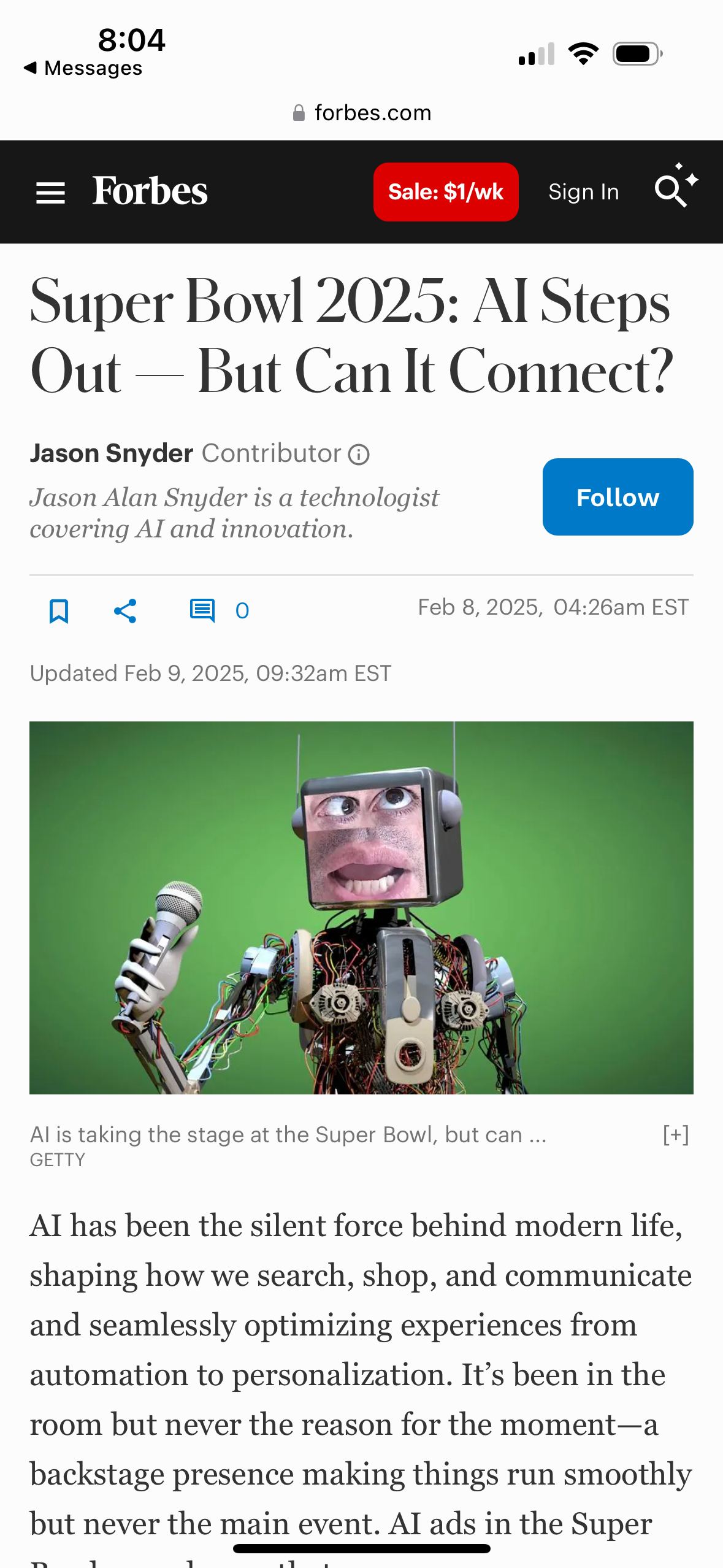
-

Rethinking How We Sell AI: From Transactions To Transformation
The traditional sales model based on consumption has been disrupted by AI, which requires a transformation-focused approach rather than a transactional one. Success in AI adoption depends on alignment, trust, and strategic guidance rather than simple scalability, as AI solutions must be integrated into an organization’s structure, culture, and processes. Companies that thrive will prioritize co-creation over selling, with roles like the Chief AI Officer ensuring AI is embedded effectively across business functions.
-

AI Is Hacking Your Hunger: How The Food Industry Engineers Addiction
The food industry is using AI to engineer hyper-palatable foods that override satiety signals and drive overconsumption, essentially re-engineering addiction, especially in response to declining sales due to GLP-1 drugs. This raises ethical concerns about consumer consent and autonomy, as AI-driven food design can manipulate eating behaviors without conscious awareness. The article argues that this trend extends beyond the food industry, highlighting how AI is being used to shape consumer choices in various sectors, often without transparency or consideration for ethical implications.
-

Architects of the future: how AI is tearing up the experiential marketing rulebook
AI is fundamentally transforming experiential marketing, moving from static campaigns to dynamic, evolving experiences. It allows for adaptive experiences that personalize interactions in real-time, creating "experiential organisms" that learn and react to audiences. However, this evolution raises significant ethical considerations, including the line between personalization and intrusion, the control of human experience, and the potential for bias in AI-driven engagement.
-

What Would the Apostle Paul Write to the Americans? A Reflection on AI, Misinformation, and the Age of Fragmentation
Inspired by a friend's question, the author reflects on what the Apostle Paul might write to Americans today, given the parallels between Paul's era and our own age of rapid change. The author speculates that Paul would address the dangers of misinformation, unchecked AI, and societal fragmentation, emphasizing the importance of human agency and moral conscience in the face of these challenges. While not attempting to emulate Paul's writing, the author believes there are crucial messages he would convey to contemporary society.
-

AI Regulation Is Dead. Here’s How Marketers Can Survive
With US regulators taking a hands-off approach to AI, while the rest of the world, particularly the EU, is implementing strict regulations, marketers face a complex legal landscape. AI is already being used in ways that exploit consumer data, raising serious ethical and privacy concerns, and brands must move beyond treating consent as a simple checkbox to building systems of trust with radical transparency. Instead of waiting for regulations, marketers need to establish their own ethical frameworks, audit AI for bias, and prepare for potential scrutiny to navigate this high-stakes environment.
-

AI Reset: Layoffs, RTO, And The New Realities Of Work
The convergence of tech layoffs, return-to-office (RTO) mandates, and the rise of AI signals a fundamental restructuring of business around AI, not just a temporary adjustment. Layoffs are driven by AI's ability to absorb job functions, while RTO is often a disguised workforce reduction strategy. Companies across various sectors, including tech, hardware, gaming, and others, are replacing human workers with AI, and those that fail to adapt to this AI-centric model risk obsolescence. The future of work requires professionals to integrate AI into their thinking, creating, and leading, rather than simply viewing it as a tool.
-
AI: The Battlefield In The War For Data Control
AI's future is being shaped by the battle for data control, not just computing power, as its importance is increasingly recognized. Simultaneously, AI faces challenges in forging genuine emotional connections with people, hindering its transition from a useful tool to a trusted and relatable presence.
-
AI: The Battlefield In The War For Data Control
A shift beyond large language models (LLMs) to reasoning AI systems is predicted, but the real battleground is data control, not just computing power. Dominance in AI will be determined by who owns and controls the training data, raising concerns about monopolies and data security risks, especially with increasingly complex AI systems and the potential for re-identification of supposedly de-identified data.
-
How DeepSeek Built On AI’s Innovation Debt
DeepSeek, a company praised for its advancements in AI, has achieved success by refining and optimizing existing technologies rather than through groundbreaking inventions. They've built upon the foundational work of companies like Google, OpenAI, and Meta, demonstrating how smaller players can leverage open-source ecosystems and existing research to make significant progress. While DeepSeek has undoubtedly made AI more accessible and efficient, the article questions whether their approach represents true innovation or simply iterative improvement, raising important questions about the nature of invention in the AI field.
-

Beyond The Illusion - The Real Threat Of AI: WEF Global Risks Report 2025
The WEF Global Risks Report 2025 highlights AI as both an opportunity and a profound risk, emphasizing its role in misinformation, algorithmic bias, and governance challenges. As AI rapidly evolves, the report warns of its unintended consequences, from deepening societal divides to amplifying systemic inequalities. The urgency of responsible oversight, ethical frameworks, and global collaboration is underscored as a critical step in ensuring AI serves humanity rather than destabilizing it.
-

TikTok And RedNote - Consent Without Transparency Isn’t Freedom; It’s Control
The rise of Red Note, a Chinese-owned social media platform, highlights the potential dangers of unchecked platform influence. By subtly suppressing dissent and shaping user behavior, Red Note challenges Western values of free speech. This raises concerns about the normalization of censorship and the erosion of democratic principles. To mitigate these risks, Jason emphasizes the need for government intervention, increased digital literacy education, and a critical evaluation of the platforms we use.
-

Inside Amazon’s Retail Ad Service: The Price Of Privacy
The ethical implications of Amazon's Retail Ad Service are examined. Concerns arise regarding consumer awareness and consent for how their data is used. The article emphasizes the need for greater transparency and user control over data usage to build consumer trust and solidify Amazon's position in the retail media market.
-

What Nvidia’s CEO Missed About Quantum Computing
The prediction by Nvidia CEO Jensen Huang that practical quantum computing is still decades away is challenged. It is argued that quantum technology is already delivering tangible value in various industries, including marketing, by solving complex optimization problems. The importance of data quality is emphasized, and businesses are encouraged to explore quantum computing through experimentation to gain a competitive advantage.
-

AI Agents Are Taking Over: And That’s Good For Business
The emergence of AI civilizations, where self-governing AI agents collaborate and evolve in virtual worlds, is explored. Project Sid, an experiment in this field, demonstrates how these agents can create and manage their own societies. This technology has the potential to reshape industries and offer businesses valuable insights for optimization.
-

Cosmic Synthesis: Uniting Cosmology, Spirituality, and Technology
The metaverse, once a hot topic, has seen a decline in interest. After Facebook's rebranding as Meta in 2021, many companies jumped on the bandwagon. However, a lack of fully functional technology and clear strategies led to waning enthusiasm. Despite this, some companies like Roblox continue to thrive, suggesting that the metaverse may still have potential for future growth.
-

What Drone Hysteria Reveals About AI, Trust And Reality
As AI continues to advance, it's becoming increasingly clear that it's not just a tool but a mirror reflecting our own biases and uncertainties. From mysterious drone sightings to AI hallucinations, we're witnessing a breakdown in shared reality. To navigate this new era, businesses and leaders must prioritize transparency, ethical AI practices, and digital literacy. 1 By addressing these challenges, we can ensure that AI serves as a tool for good, rather than a source of confusion and division.
-

Election Lessons For CMOs: Escaping The Bias Trap To Drive Innovation
The "Attributional Trap," a cognitive bias that overemphasizes internal factors while overlooking external influences, can hinder marketing innovation. This bias, similar to limitations in traditional election campaigns, can lead to an overemphasis on "safe" strategies. To avoid this, CMOs are encouraged to build diverse teams, foster "edge thinking," and continuously adapt to evolving market dynamics.
-

Neuromarketing: AI-Enabled Brain-Computer Interfaces Shaping Our Future
Brain-computer interfaces (BCIs) are poised to revolutionize marketing. By analyzing brain activity, marketers can gain deeper insights into consumer behavior and create more effective campaigns. However, it's crucial to address ethical concerns and ensure responsible use of this powerful technology.
-

Responsible AI Innovation: Driving Ethical Change
As AI continues to reshape industries, the importance of responsible innovation is becoming increasingly clear. This article explores the need for ethical AI practices and highlights the power of collaboration in driving positive change. By fostering communities of AI experts and policymakers, we can ensure that AI is developed and deployed in a way that benefits society.
-

The Hidden Costs Of AI Ethics: Understanding Reputational Risk
Discover the hidden costs of AI ethics and how they can impact your brand's reputation. From biased algorithms to data privacy breaches, explore the ethical dilemmas that arise when AI is used irresponsibly. Learn how to navigate these challenges and ensure your AI initiatives align with ethical principles.
-

Data might be oil, but consent is golden
Forget avatars and embrace identities. When navigating the multiverse of consumer identities, remember that consent is king.
-

A New Dawn: Reimagining AI Beyond Human Intelligence
Yesterday, a single-sentence statement circulated by the Center for AI Safety included an endorsement by renowned executives from organisations like OpenAI and Google DeepMind, sounding a dire warning about the existential threat artificial intelligence poses, saying…
-

The Fine Line of Authorship: Protecting Originality in the Age of AI
The ethical and philosophical implications of AI-generated art are explored. While AI can effectively mimic human creativity, it lacks true intersubjectivity and emotional depth. The article emphasizes the importance of recognizing the value of genuine human expression and the potential risks of relying solely on AI-generated content. It calls for a multi-pronged approach, including updated intellectual property laws and public education, to ensure that technology enhances, rather than limits, human creativity.
-

Humanity on the Edge: AI, Technological Intermediaries and the Quest for Intersubjectivity
Navigating the uncharted waters of our digital future, many technological intermediaries increasingly envelop us. AI-powered entities have woven themselves into the fabric of our lives, mediating our interactions, decisions, and experiences.
-

Extended reality brings brands into multiple worlds – are they ready?
Brands must grapple with the ‘intersubjectivity’ brought by a new kaleidoscope of digital worlds and identities.
-

Quantum Computing Matters for Advertising, Brands and Marketers
The technology that enables Quantum Computing is advancing quickly, and the capabilities and availability of Quantum Computing will quickly improve.
-

Data humanization: 6 ways to maximize consumer empowerment and trust
There’s one approach that can bring together privacy-minded people with data-hungry brands: data humanization.
-

The metaverse is ready, but are businesses, consumers and you?
The recent explosion of all things ‘metaverse’ owes a great deal to the convergence of technology, disease, economics and happiness (or lack of it).
-

Cultivating human-machine trust with responsible advertising
As AI becomes integral to our lives, fostering positive human-machine relationships is crucial
-

The Metaverse Is Not A Game
The metaverse has no outcome; It is not a game. It is an opportunity to invent a more creative and positive future. It's a fertile space to redefine ourselves, our identity, work, culture, and society.
-

God in the Machine — Artificial Intelligence, Coronavirus, Racism and Religion
“Where is God?” I have been asking this question more than usual lately. It’s not a loaded question charged with doubt or accusation. It’s advice I give to my twelve-year-old son — “Always look for God.”
-

4 Ways to Catch Robots' Attention With Your Marketing Artificial intelligence often first line of contact with consumers
As Artificial Intelligence increasingly controls the relationship between brands and consumers I provide four critical points to keep in mind.
-

A Brand Marketer's Guide To The Robot Uprising
AI and robotics are reshaping industries. While some jobs may be automated, new opportunities will arise. Marketers must adapt to this changing landscape by understanding the needs of both human and AI consumers.
-

AGI - Managing The Risks: How CMOs Can Lead The Next Wave In AI
CMOs can harness the power of Artificial General Intelligence (AGI) by adopting a task-limited approach. This involves defining clear boundaries, limiting memory, enforcing ethical guardrails, and restricting autonomy. This ensures AGI remains a valuable tool while minimizing risks.



